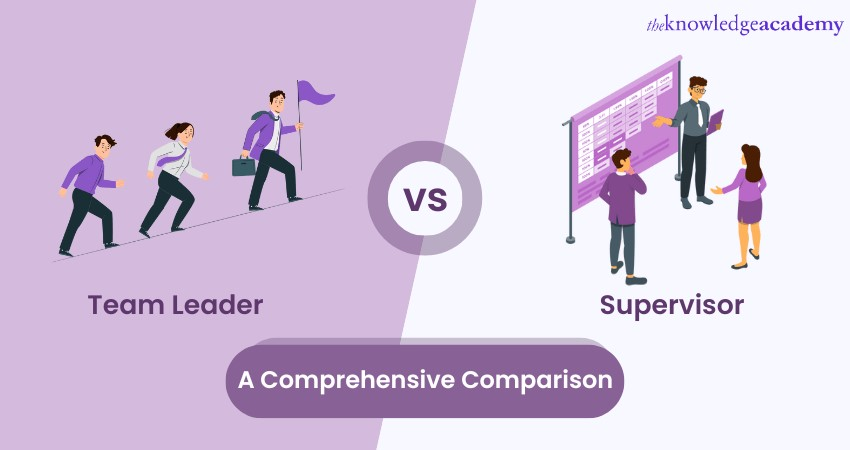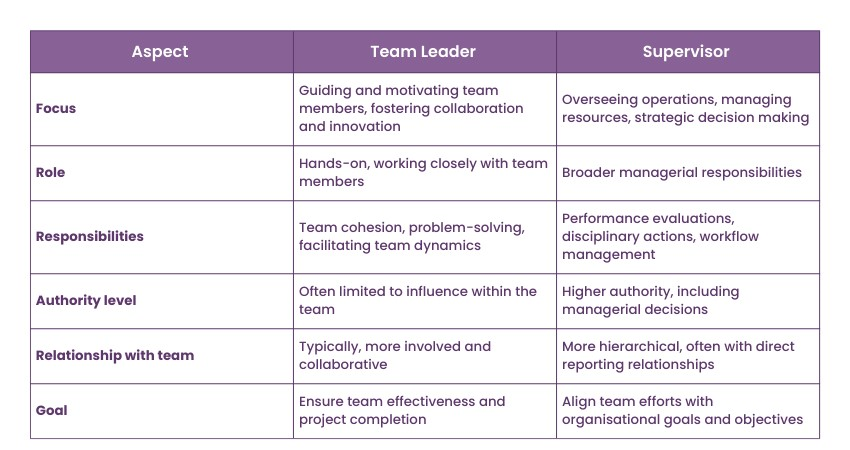We may not have the course you’re looking for. If you enquire or give us a call on +40 316317743 and speak to our training experts, we may still be able to help with your training requirements.
Training Outcomes Within Your Budget!
We ensure quality, budget-alignment, and timely delivery by our expert instructors.

In the organisational hierarchy, the roles of a Team Leader and a Supervisor, while overlapping in certain functions, distinctly vary in scope and execution. There is a distinct difference between Team Leader vs Supervisor. A Team Leader primarily focuses on guiding and motivating a group of individuals towards achieving specific project goals or tasks.
On the other hand, a Supervisor assumes a broader managerial role. They oversee operations, manage resources, and are responsible for strategic decision-making. In this blog, you will learn about the significant distinction between Team Leader vs Supervisor, their roles, responsibilities and fundamental similarities.
Table of Contents
1) Who is a Supervisor?
2) How can you define a Team Leader?
3) Difference between Team Leader and Supervisor
4) Similarities between Team Leader and Supervisor
5) Conclusion
Who is a Supervisor?
A Supervisor is a key figure within an organisation, overseeing and managing employees' daily activities or a work team. Their primary role is ensuring tasks and projects are completed efficiently and effectively. Supervisors provide their team guidance, instruction, and direction, often serving as a first point of contact for employees' work-related issues.
They are also tasked with performance evaluation, offering feedback, and sometimes involved in disciplinary actions. Supervisors are critical in maintaining workflow, managing resources, and ensuring the team's efforts align with organisational goals and objectives.
How can you define a Team Leader?
A Team Leader provides a group with guidance, instruction, and direction to achieve a specific task or project. This role involves facilitating team dynamics, motivating team members, and fostering an environment conducive to effective collaboration and productivity.
Team Leaders typically have a hands-on approach, working closely with their team members to ensure tasks are completed efficiently. They also play a crucial role in team problem-solving, decision-making, and conflict resolution. A Team Leader's primary focus is on team cohesion and performance, ensuring that the group's activities align with broader organisational objectives.
Difference between Team Leader and Supervisor

Here, the differences between Supervisor and Team Leader are explained in detail:
Responsibilities
The responsibilities of Team Leaders and Supervisors, while intersecting, have distinct differences that highlight their roles in an organisation:
1) Team Leaders:
a) Guiding team members: They directly guide and support team members in their daily tasks and projects.
b) Fostering collaboration: Team Leaders encourage teamwork and collaboration within the group.
c) Problem-solving: They are actively involved in addressing challenges that the team faces.
d) Facilitating communication: Ensuring clear and effective communication within the team.
e) Motivating employees: They focus on keeping the team motivated and engaged.
2) Supervisors:
a) Operational oversight: Supervisors manage the day-to-day operations of their department or team.
b) Performance evaluations: They are responsible for assessing employee performance and providing feedback.
c) Resource management: Supervisors allocate resources, including staffing and budgeting.
d) Strategic planning: They are involved in higher-level planning and decision-making.
e) Disciplinary actions: Supervisors handle disciplinary measures and conflict resolution.
Qualifications
The qualifications required for Team Leaders and Supervisors differ, reflecting their distinct roles and responsibilities within an organisation:
1) Team Leaders:
a) Relevant technical skills: Expertise in the specific area or project the team is working on.
b) Leadership training: May include courses or certifications in Team Leadership or project management.
c) Interpersonal skills: Strong communication, conflict resolution, and motivational skills.
d) Experience: They should have a proven track record in a similar role or as a high-performing team member.
2) Supervisors:
a) Higher education: Often requires a bachelor's degree or higher in a relevant field.
b) Management training: Formal education in management, such as an MBA, is frequently preferred.
c) Extensive experience: Broader experience in the field, including management or Supervisory roles.
d) Advanced leadership skills: Advanced training in leadership, strategic planning, and human resources.
Working conditions
The working conditions of Team Leaders and Supervisors vary, reflecting their distinct roles and environments:
1) Team Leaders:
a) Collaborative environment: Often work closely with their team in a collaborative and interactive setting.
b) Project-based tasks: Their work is typically centred around specific projects or tasks.
c) Flexible roles: These may involve a variety of tasks requiring adaptability.
d) Hands-on involvement: Direct involvement in day-to-day activities and problem-solving within the team.
2) Supervisors:
a) Managerial setting: Work in a more formal managerial environment, overseeing multiple teams or departments.
b) Strategic focus: Involves strategic planning and long-term decision-making.
c) Administrative duties: More administrative work, including reporting, budgeting, and policy implementation.
d) Regulatory compliance: Ensuring the team or department complies with organisational and legal standards.
Skills
The skills required for Team Leaders and Supervisors differ, reflecting their distinct roles within an organisation:
1) Team Leaders:
a) Technical expertise: Proficient in specific skills related to the team's tasks.
b) Interpersonal skills: Strong in communication, motivation, and conflict resolution.
c) Team building: Skilled in fostering teamwork and collaboration.
d) Adaptability: Ability to adjust to changing circumstances within the team.
e) Problem-solving: Competent in identifying issues and developing practical solutions.
2) Supervisors:
a) Management skills: Proficient in overseeing operations and managing resources.
b) Strategic thinking: Ability to plan and make decisions that align with organisational goals.
c) Leadership abilities: Advanced skills in leading, mentoring, and developing staff.
d) Administrative competence: Skilled in handling paperwork, budgets, and reports.
e) Regulatory knowledge: Understanding of legal and organisational policies and procedures.
Vision and objectives
The vision and objectives of Team Leaders and Supervisors differ, reflecting their varying roles in an organisation:
1) Team Leaders:
a) Short-term objectives: Focus on achieving specific project goals or immediate team tasks.
b) Team-centric vision: Develop and communicate a vision that motivates and unites the team around their specific tasks or projects.
c) Operational focus: Concentrate on the practical aspects of achieving team goals and improving team performance.
2) Supervisors:
a) Long-term objectives: Set and manage broader goals that align with the organisation's strategic objectives.
b) Organisational vision: Craft and uphold a vision that aligns with the organisation’s long-term goals and values.
c) Strategic focus: Oversee the strategic planning process, including setting objectives, allocating resources, and evaluating outcomes on a departmental or organisational level.
Interactions with others
The nature of interactions with others for Team Leaders and Supervisors reflects the differing scope of their roles:
1) Team Leaders:
a) Direct interaction: Frequently interact directly with team members daily.
b) Hands-on guidance: Provide team members with hands-on guidance, support, and feedback.
c) Collaborative approach: Engage in a collaborative working style, often alongside team members.
d) Conflict resolution: Involved in resolving conflicts within the team.
2) Supervisors:
a) Broader interaction: Interact with a more comprehensive range of individuals, including upper management, different departments, and external stakeholders.
b) Oversight and direction: Provide oversight and direction rather than direct, hands-on guidance.
c) Managerial communication: More formal and structured interactions, focusing on reporting, compliance, and performance evaluation.
d) Policy enforcement: Handle higher-level conflict resolution and enforce organisational policies.
Salary
Here are some differences between the salary of a Team Leader and Supervisor according to companies:
a) Team Leader
|
Companies |
Avg. Salary/yr |
|
NHS |
£44,013 |
|
Voyage Care |
£35217 |
|
GAIL’s Bakery |
£33689 |
|
Waitrose & Partners |
£30917 |
|
SSP |
£30549 |
Source: Indeed
b) Supervisor
|
Companies |
Avg. Salary/yr |
|
Outwood Grange Academics Trust |
£48,486 |
|
Iceland Foods |
£40,701 |
|
Orridge |
£37,514 |
|
Young’s Pubs |
£37,021 |
|
Compass Group |
£36,463 |
Source: Indeed
Similarities between Team Leader and Supervisor
Despite their differences, Team Leaders and Supervisors share several similarities:
1) Goal-oriented: Both are focused on achieving specific objectives, whether they are team-specific or organisational.
2) Leadership roles: They hold leadership positions and are responsible for guiding others.
3) Communication skills: Effective communication is key in both roles for conveying expectations and feedback.
4) Decision-making: Both are involved in decisions affecting their teams or departments.
5) Problem-solving abilities: They need strong problem-solving skills to address challenges within their scope of work.
6) Influence on team culture: Both significantly impact the work environment and team culture.
Conclusion
While Team Leaders and Supervisors share commonalities in leadership and goal orientation, they differ significantly in their focus, responsibilities, and scope. The significant differences between Team Leader and Supervisor help in effective team and organisational management. We hope you understand their differences to help you know what you aspire to become.







 Top Rated Course
Top Rated Course




 If you wish to make any changes to your course, please
If you wish to make any changes to your course, please


